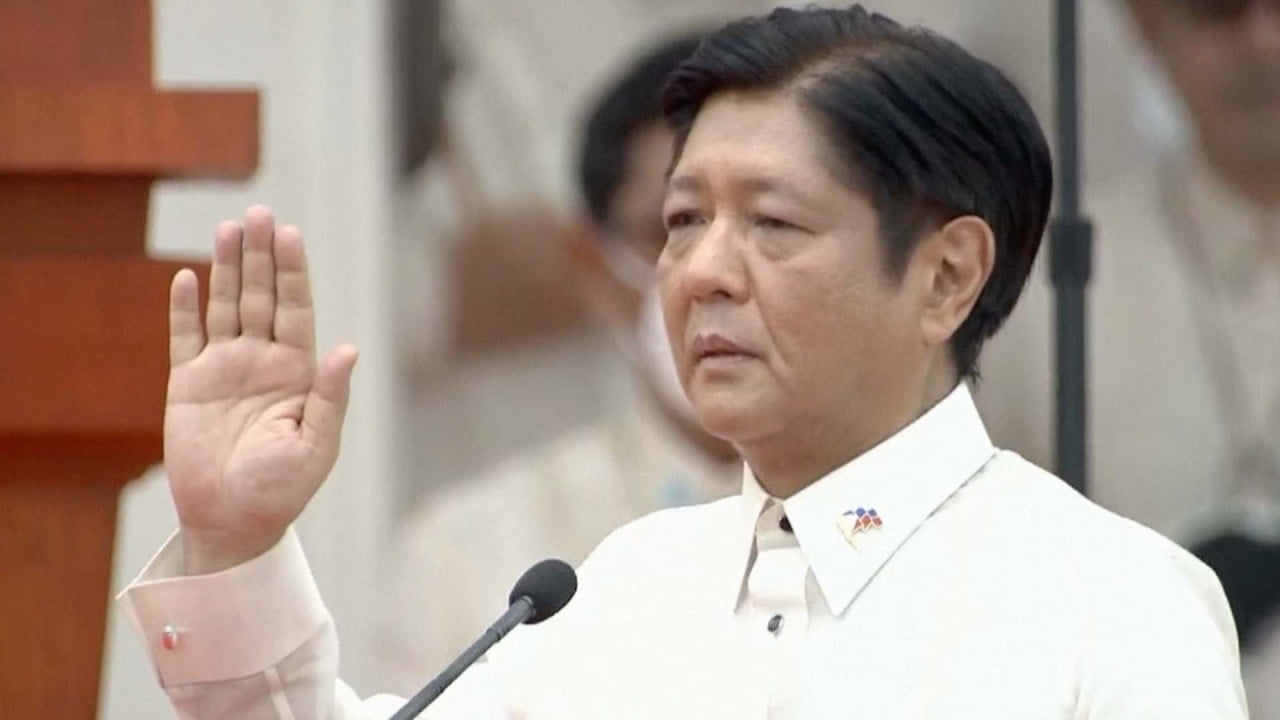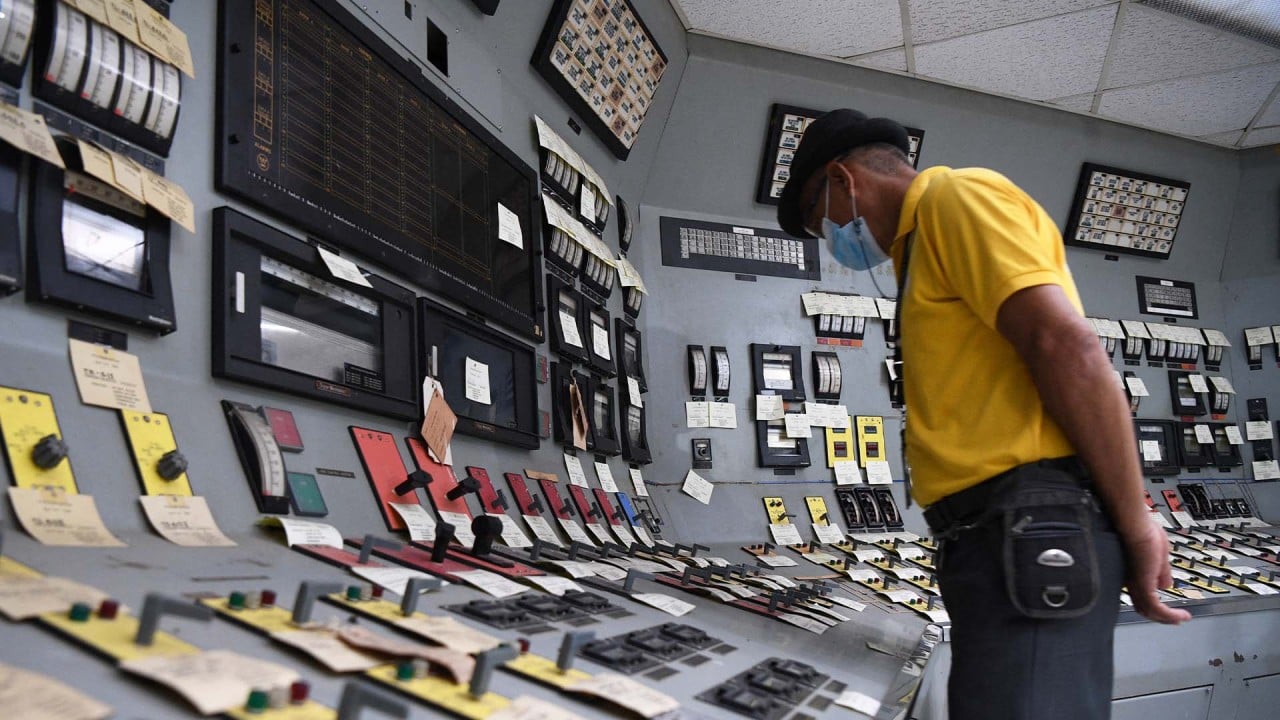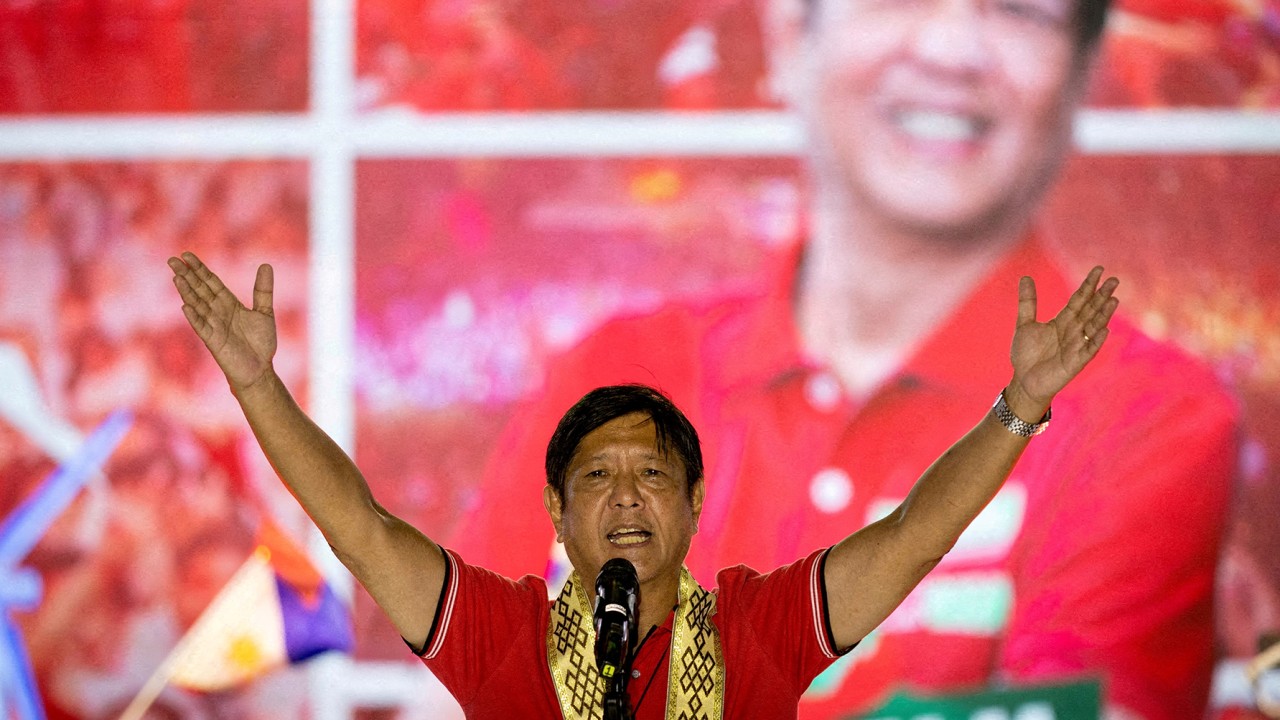
Philippines’ food and energy crises, China oil deal to greet Marcos Jnr as he takes office
- Outgoing President Duterte leaves Marcos Jnr with a greater national debt burden and 5.4 per cent domestic inflation that could exceed 6 per cent by July
- Marcos Jnr will have to navigate surging prices, a looming energy crisis, poor infrastructure and rising Covid-19 cases in Manila
After he is sworn in on Thursday, he will have to tackle the ongoing surge in prices of basic goods, electricity and oil, alongside a looming energy crisis and pressure from China to sign an oil exploration agreement.
Other concerns include continued public transportation woes in Metro Manila, the capital region that is the heart of the country’s industry and finance. The region is also battling a resurgence of Covid-19 infections.

Duterte will leave Marcos Jnr with a national debt burden of 13 trillion pesos – having added 7 trillion pesos to it – and a 5.4 per cent domestic inflation rate.
Nicholas Mapa, ING Bank’s senior economist for the Philippines, warned that the inflation rate could breach six per cent by July “due to still elevated commodity prices and a weaker currency fanning imported inflation pressures”.
Mapa also said that because the Philippine central bank “prefers the relatively less aggressive pace of tightening” monetary policy even as other foreign central banks tighten theirs aggressively, “we can expect even faster inflation and a weaker peso for the rest of the year”.
Public transport companies have started laying off bus drivers, while an increasing number of commuter jeep drivers in Manila said they would stop driving since their earnings were less than what they were paying for diesel, even with a government-approved fare increase.
Because of all these factors, the leftist group Bagong Alyansang Makabayan (New Patriotic Alliance) has urged Marcos Jnr to make his first executive order something “related to suspending oil taxes and bringing down the prices of basic commodities”.
Running low on gas
The Philippines is “running out” of natural gas sourced from the Malampaya gas field while coal and oil import prices continue to rise, former supreme court justice Antonio Carpio said in an interview last week.
The only viable replacement energy source might be the extraction of potential oil and gas deposits in the vicinity of the Reed Bank, he said.

China, which claims the area as part of its sweeping nine-dash line claim over the South China Sea, has thus far prevented Manila from undertaking such activities unless the latter signs a joint development agreement.
The Reed Bank is an energy-rich area of the South China Sea that the Philippines claims as being within its exclusive economic zone (EEZ) – a claim that was backed up by the Permanent Court of Arbitration in The Hague in 2016.
China does not recognise that ruling. The region lies 85 nautical miles from the Philippines’ Palawan Island and 595 nautical miles from the coast of China’s Hainan province.
The Department of Energy (DOE) under outgoing President Duterte has downplayed the depletion of gas deposits in Malampaya. DOE data however showed that Malampaya’s “dependable capacity” in megawatts dropped from 22.9 per cent in 2015 to 13 per cent in 2021.
The decline has been substituted by coal-fired and oil-based power plants heavily dependent on imported coal and oil.
In a media interview this week, Danilo Lachica, president of the Semiconductor and Electronics Industries in the Philippines Foundation, said operational costs were rising because some energy suppliers had increased their rates in response to a coal shortage and the global increase in oil prices.
Lachica said representatives of his group were trying to meet Marcos Jnr to explain their urgent concerns.
Filipinos and the entire economy, and not just the semiconductor industry, were at risk, Carpio warned.
He said the only solutions were to import liquefied natural gas, which would raise power rates at the expense of consumers, and to develop the Reed Bank area that is believed to have large gas deposits.
Carpio noted that gas in Malampaya would continue to deplete and by 2027 – or two years after the current gas field service contract expires – more drilling would be needed to be able to extract any remaining gas. “We don’t have time any more. It will take five years to develop Reed Bank,” he said.
As Gulf nations eye clean energy, what does this mean for Asia?
The China factor
Beijing meanwhile has swiftly signalled its readiness to start a new round of negotiations with the new administration. Foreign Ministry spokesperson Wang Wenbin announced in a June 24 press briefing that China “will strive to take early substantive steps so as to deliver tangible benefits to both countries and peoples”.
In a separate news briefing, Philippine tycoon Manuel Pangilinan told reporters that PXP Energy, of which he sits as the chairman, along with its subsidiary Forum, was ready to resume its oil and gas exploration in the West Philippine Sea provided it was given “protection”.
“We want to continue with our work programme precisely to determine once and for all if there’s gas in the area, but if we are stopped by outside forces, what can we do? Who will protect us? We are a private-sector company. Those boats are leased by us, those are not Filipino-registered boats,” he said.
Whitsun Reef row: could Manila lose another South China Sea feature to Beijing?
In 2011, a seismic survey ship hired by Forum Energy to explore the gas fields in the Reed Bank was pushed back by two Chinese patrol ships. To ease tensions, the government of then-president Benigno Aquino III asked Forum Energy to stop its survey exploration.
The ban has not been lifted by Duterte.
Carpio said that under Duterte, a third agreement on the joint oil exploration was about to be signed but Beijing purportedly “at the last minute” sought a change in a so-called “first whereas clause”.
He explained that the clause stated that Philippine law would govern the contract. “Teddy said no [to the changes]. He will never agree to those changes. I commend him for that,” said Carpio, referring to outgoing Foreign Secretary Teodoro “Teddy” Locsin Jnr.

He said the change desired by China would have violated the Philippine Constitution and reversed the 2016 arbitral court ruling.
The pressure on Marcos Jnr to perform has been so intense that his spokesman Vic Rodriguez issued a public appeal to his supporters on June 24. “We are asking for your wholehearted support and many prayers, because we know the Filipino people have very high expectations on the leadership of the next president.”




